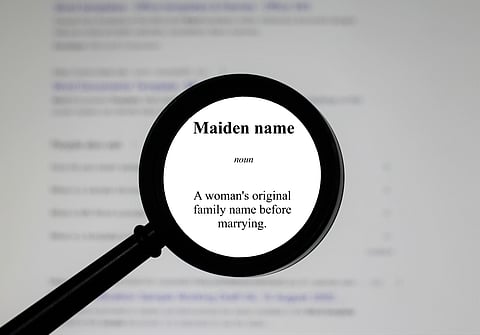What Is A Mother's Maiden Name?
Have you ever been asked for your mother's maiden name as a security question? Or maybe you're trying to trace your family history and need to know your grandmother's maiden name. In either of these cases, you might’ve found yourself wondering what a mother's maiden name even is and why it's so important.
If that sounds like you, you’re in the right place. In this article, we'll take a closer look at what a maiden name is and why it's still relevant in today's world, no matter who you are. We'll also give you some tips on how to find a mother's maiden name if you don't already know it.
What Is a Mother’s Maiden Name?
A mother's maiden name is simply the surname she had before she got married. It's basically a snapshot of her family history, a link to her ancestors. Traditionally, when a woman got married, she would take her husband's surname, leaving her maiden name behind. It’s a common practice in lots of Western cultures and has been for centuries.
Now, though, times have changed. These days, a lot of women choose to keep their maiden names after marriage or even combine their maiden name with their husband's surname. Some may also hyphenate their names.
A mother's maiden name was a more straightforward concept at one point, but it’s become a bit more flexible over the years. Whether a woman keeps her maiden name or not, it almost always holds sentimental value for them; it’s a reminder of her roots and her family heritage.
Why Is a Mother’s Maiden Name Important?
A mother's maiden name is a valuable piece of information for a number of reasons. First and foremost, it's usually used as a security question on websites and online accounts; if you provide it, you’ll want to remember it. It’s used as such because it's a piece of information that's unlikely to be known to anyone but close family members.
Secondly, a mother's maiden name can be a big clue in genealogy research if you choose to get it done. If you know your mother's maiden name, you can trace your family history back to her side of the family. This will help you discover new relatives, learn about your ancestors' lives, and maybe even find some interesting family stories.
The final use case would be in some legal situations where a mother's maiden name might be a requirement. A common example is when you’re applying for a passport or visa or when changing your name; it’s possible they might ask for your mother’s maiden name. All of this is to demonstrate that, while a mother's maiden name might seem like a rather simple piece of information, it can be surprisingly important in a variety of contexts.
Finding a Mother's Maiden Name
If you don't already know your mother's maiden name, don't worry. It's not always easy to remember since, despite its importance, it’s used pretty infrequently. There are a few ways to track it down, the easiest of which is to just ask your mother directly. She might have a document or a keepsake that includes her maiden name or remember it from memory.
If you can't ask your mother, or if she doesn't remember, you can try searching for her marriage certificate. This document will almost always include her maiden name since it’s a part of the procedure. If you need to find this certificate on your own, you can usually get it at your local government office or online.
In the case that this doesn’t work either, you can try searching for her birth certificate or the birth certificates of her children (i.e., your own). These should also include the mother's maiden name. If you're still stumped, try looking her name up on a free people search site. This tool lets you search for people by name and will likely show you what the mother’s maiden name was without any need for physically finding documents.
The Maiden Name Mystery
By now, you should have a clear understanding of what a mother's maiden name is and how to find it. It’s certainly more than just a piece of trivia. In fact, it’s a link to her past, a key to discovering your own family history, and an important piece of personal information in a lot of contexts.
So, the next time someone asks you for this seemingly insignificant detail, remember its importance and take a moment to appreciate the story it tells.
Inspired by what you read?
Get more stories like this—plus exclusive guides and resident recommendations—delivered to your inbox. Subscribe to our exclusive newsletter
Resident may include affiliate links or sponsored content in our features. These partnerships support our publication and allow us to continue sharing stories and recommendations with our readers.

